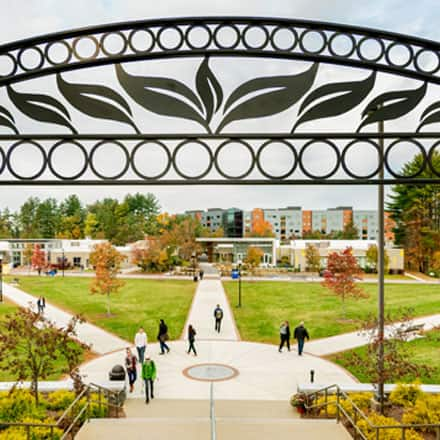SNHU Receives Bronze Rating From STARS
The Southern New Hampshire University (SNHU) Office of Sustainability's efforts to track and assess the university's sustainability initiatives was recognized recently, earning SNHU a STARS Bronze rating.

STARS – or Sustainability Tracking, Assessment & Rating System – is a program managed by the Association for the Advancement of Sustainability in Higher Education (AASHE). SNHU uses systems to monitor sustainability initiatives and performance, according to Michael Weinstein, SNHU's director of sustainability.
“We are proud of SNHU’s Bronze rating by STARS and are committed to becoming a leader in sustainability by engaging and empowering our global community,” Weinstein said. “By convening stakeholders, measuring our impact and sharing knowledge and successes, we have an opportunity to advance a sustainable organization and culture that we hope will result in a ripple effect of positive impacts on the communities our employees and learners call home.”
AASHE’s STARS program includes more than 900 participants in 40 countries and is a widely recognized framework globally for the public reporting of college and university sustainability efforts, according to AASHE. Schools are rated in five areas:
- Academics
- Engagement
- Operations
- Planning and administration
- Innovation and leadership

“STARS was developed by the campus sustainability community to provide high stands for recognizing campus sustainability,” said Meghan Fay Zahniser, AASHE’s executive director. “SNHU has demonstrated a substantial commitment to sustainability by achieving a STARS Bronze Rating and is to be congratulated for their efforts.”
SNHU's last STARS rating came in 2019. Since then, the Office of Sustainability was created, as well as other programs leading to the bronze rating, including:
- Eco-Reps Program: Eco-Reps are charged with promoting responsible behaviors and education to their peers and colleagues about sustainability programming at the university, such as the arboretum and outdoor classrooms, Move-In Cardboard Collection and more.
- Sustainability Community of Practice: The Sustainability Community of Practice includes employees interested in the business aspect of sustainability and works on educational efforts to improve sustainable practices in everyday life.
- Energy Consumption: SNHU reduced its total source energy consumption by more than 21% per unit of floor area in its campus and Millyard facilities.
More about the STARS report is available online.
Joe Cote is a writer and organic marketer at Southern New Hampshire University (SNHU), where he has worked since 2016. Previously he spent more than a dozen years as a reporter and editor at weekly and daily newspapers in Vermont and New Hampshire. He lives near SNHU's Manchester, New Hampshire campus with his wife and daughter. Connect with him on LinkedIn.
Explore more content like this article

SNHU Advances Workforce Skilling with New Professional Skills Microcredentials

SNHU’s Dr. Kevin Wright Recognized as ACPA Foundation Diamond Honoree

SNHU Launches Innovative 3-Year Business Degree as Part of New Campus-Based Program Expansion
About Southern New Hampshire University

SNHU is a nonprofit, accredited university with a mission to make high-quality education more accessible and affordable for everyone.
Founded in 1932, and online since 1995, we’ve helped countless students reach their goals with flexible, career-focused programs. Our 300-acre campus in Manchester, NH is home to over 3,000 students, and we serve over 135,000 students online. Visit our about SNHU page to learn more about our mission, accreditations, leadership team, national recognitions and awards.


